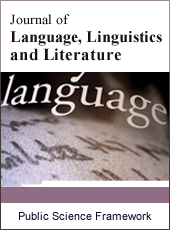Journal of Language, Linguistics and Literature
Articles Information
Journal of Language, Linguistics and Literature, Vol.4, No.3, Sep. 2018, Pub. Date: Aug. 31, 2018
Analysis of Japanese Teaching Reform in the Direction of Outsourcing Service Under JSP Theory
Pages: 39-44 Views: 2301 Downloads: 308
[01]
Wang Jiadong, Department of Foreign Language, Shandong Jiaotong University, Jinan, China.
The statistics of the Ministry of Commerce show that from 2009 to 2013, the market size of our outsourcing service is 14.47, 20, 32.385, 46.57, 63.85 (billion dollars). It can be said that it has been developing fast. By contrast, the proportion of outsourcing service to Japan has declined, from 2009 to 2013, it is 32.3%, 33%, 30%, 14.4%, 11.4%, respectively. Total implementation in 2013 was only $5.15 billion. But, since 2013, Japan's software and information service outsourcing industry has reversed its downward trend. It is expected that Japan will continue to grow in the next few years until the 2020 Olympic Games. The automobile and retail industry will be an important driving force for growth. To meet the market demand for outsourcing service to Japan, many colleges and universities in our country have set up relevant specialties. Companies also have been developing business training for outsourcing service. After years of development insiders found that the main source of outsourcing service talents in China is universities. However, many colleges and universities have some problems in their specialty settings, such as inaccurate positioning and unclear training objectives. This directly leads to a lack of clear direction for students’ learning, and it is difficult for students to find suitable jobs when they leave schools. And because of the rapid market change, education in colleges and universities often appears disjointed. This will make it difficult for college graduates to meet their job needs in a short time. So the healthy and effective development of related majors to outsourcing service in universities will undoubtedly play a positive role in the development of this field. Outsourcing service requires professional software knowledge and professional Japanese knowledge. So it's different from the traditional Japanese Teaching, Japanese education in the field of outsourcing service needs more pertinence. JSP theory is a teaching theory aiming at Japanese requirements in a specific field. In this article, author will analyze the Japanese teaching reform in the direction of outsourcing service from the JSP theory.
Outsourcing Service, JSP, Teaching Reform, Japan
[01]
Liu Wei (2013), The development and Enlightenment of Japanese special purpose Japanese Education Research, Journal of Japanese Language Study and Research.
[02]
Wang Dongli, Yu Fang (2013), Research on Japanese teaching reform in Vocational Colleges Based on Service Outsourcing, Journal of Education Institue of Jilin province.
[03]
Wang Jiadong (2015), Analysis of the dilemma and breakout strategy of service outsourcing industry to Japan, Asia-Pacific Education.
[04]
Qian Wanwan, Liu Xiao (2016), Analysis on characteristics of Japanesein software outsourcing based on jobs, Rencaiziyuankaifa.
[05]
Liu Yifei (2016), Problems and Countermeasures on Japanese Teaching for Japanese software outsourcing majors in Higher Vocational School, Western China Quality Education.
[06]
Qian Wanwan (2015), Analysis of Japanese level based on the demand for software outsourcing jobs in Japan, Journal of Harbin Vocational & Technical College.
[07]
Fu Daan (2016), Research on Transformation of EGP teachers to ESP teachers in Local Universities, Foreign Languages and Their Teaching.
[08]
Yi Han (2018), Study on the mode of ESP cooperation between Chinese and foreign teachers, Shandong Foreign Language Teaching.
[09]
Li Hong (2018), Problems in ESP teaching in Colleges and suggestions for improvement, Theory and Practice of Education.
[10]
Pan Yu (2018), Review and Prospect of ESP teaching research in China, Journal of Higher Education.

ISSN Print: 2381-7054
ISSN Online: 2381-7062
Current Issue:
Vol. 6, Issue 1, March Submit a Manuscript Join Editorial Board Join Reviewer Team
ISSN Online: 2381-7062
Current Issue:
Vol. 6, Issue 1, March Submit a Manuscript Join Editorial Board Join Reviewer Team
| About This Journal |
| All Issues |
| Open Access |
| Indexing |
| Payment Information |
| Author Guidelines |
| Review Process |
| Publication Ethics |
| Editorial Board |
| Peer Reviewers |


